| Listing 1 - 10 of 113 | << page >> |
Sort by
|
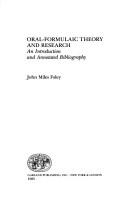
ISBN: 0824091485 9780824091484 Year: 1985 Publisher: New York (N. Y.): Garland,
Abstract | Keywords | Export | Availability | Bookmark
 Loading...
Loading...Choose an application
- Reference Manager
- EndNote
- RefWorks (Direct export to RefWorks)
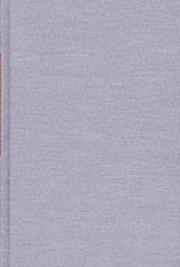
ISBN: 9780801497179 0801497175 0801424720 1501731920 Year: 1991 Publisher: Ithaca London : Cornell University Press,
Abstract | Keywords | Export | Availability | Bookmark
 Loading...
Loading...Choose an application
- Reference Manager
- EndNote
- RefWorks (Direct export to RefWorks)
Oral tradition. --- Oral-formulaic analysis. --- Epic poetry --- History and criticism.
Book
ISBN: 0520009835 9780520009837 Year: 1972 Publisher: Berkeley University of California Press
Abstract | Keywords | Export | Availability | Bookmark
 Loading...
Loading...Choose an application
- Reference Manager
- EndNote
- RefWorks (Direct export to RefWorks)
Oral-formulaic analysis. --- Homer. --- Iliad (Homer). --- Troy (Extinct city). --- Turkey
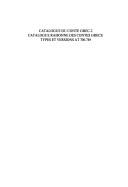
ISBN: 9782706812019 270681201X Year: 1995 Publisher: Athènes: Centre de recherches néohelléniques de la Fondation nationale de la recherche scientifique,
Abstract | Keywords | Export | Availability | Bookmark
 Loading...
Loading...Choose an application
- Reference Manager
- EndNote
- RefWorks (Direct export to RefWorks)
Tales --- Popular literature --- Folklore --- Oral tradition --- Oral formulaic analysis.
Book
ISBN: 2130790917 Year: 2006 Publisher: Paris : Presses Universitaires de France,
Abstract | Keywords | Export | Availability | Bookmark
 Loading...
Loading...Choose an application
- Reference Manager
- EndNote
- RefWorks (Direct export to RefWorks)
Peu utilisé dans notre langage moderne, le proverbe est toujours fascinant car il reste un support pour de nombreux jeux parodiques. Objet de collectes où se rejoignent travail savant et tradition populaire, il intéresse les linguistes et les sémioticiens comme les sociologues et les anthropologues. Les auteurs analysent les relations avec le langage commun, la logique et le réalisme de ce langage proverbial, la question d'une définition des normes, d'une classification complexe, des niveaux d'une reprise linguistique.
Proverbs --- Semantics. --- Oral-formulaic analysis. --- History and criticism.
Book
ISBN: 9780674278547 0674278542 Year: 2024 Publisher: Cambridge, Massachusetts : Harvard University Press,
Abstract | Keywords | Export | Availability | Bookmark
 Loading...
Loading...Choose an application
- Reference Manager
- EndNote
- RefWorks (Direct export to RefWorks)
Grounded in the intellectual legacies of two pioneering scholars of oral literature, Milman Parry (1902–1935) and Albert Lord (1912–1991), Singers and Tales in the Twenty-First Century gathers reflections on what the study of oral poetry might mean today across diverse poetic traditions, especially in light of ongoing global transformations that have dramatically reshaped and destabilized the very notion of tradition. This collection of essays spans disciplinary perspectives from Classics and comparative literature to musicology and anthropology. Oral traditions from ancient Greece and modern southeastern Europe, on which Parry and Lord focused, remain central in the present volume, but the book also offers important perspectives from regions beyond Europe, especially across Asia.The title’s “singers and tales”—both in the plural, as opposed to an individual “singer of tales”—signals interest both in the polyphony of oral traditions and in the proliferation of methodologies and objects of study inspired by the work of Parry and Lord. Their notion of what has become known as the Oral-Formulaic Theory remains a necessary starting point—but only a starting point—for research on a whole range of verbal and musical arts.
Folk poetry --- Oral-formulaic analysis --- Parry, Milman --- Lord, Albert Bates
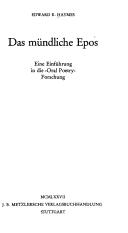
ISBN: 3476101517 9783476101518 Year: 1977 Volume: 151 Publisher: Stuttgart: J. B. Metzler,
Abstract | Keywords | Export | Availability | Bookmark
 Loading...
Loading...Choose an application
- Reference Manager
- EndNote
- RefWorks (Direct export to RefWorks)
Poetry --- Folk poetry --- Oral-formulaic analysis --- History and criticism --- -Oral-formulaic analysis --- Formulaic analysis, Oral --- Folk literature --- Folklore --- Oral tradition --- Oral poetry --- Methodology --- Oral-formulaic analysis. --- History and criticism. --- Folk poetry - History and criticism
Book
ISBN: 0198143451 Year: 1968 Publisher: Oxford : Clarendon P.,
Abstract | Keywords | Export | Availability | Bookmark
 Loading...
Loading...Choose an application
- Reference Manager
- EndNote
- RefWorks (Direct export to RefWorks)
Oral-formulaic analysis --- Analyse des formules orales --- Homer --- Epic poetry, Greek --- Oral-formulaic analysis. --- Rhetoric, Ancient. --- History and criticism. --- Language. --- Homer.
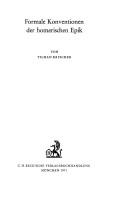
ISBN: 3406032966 Year: 1971 Volume: Heft 56
Abstract | Keywords | Export | Availability | Bookmark
 Loading...
Loading...Choose an application
- Reference Manager
- EndNote
- RefWorks (Direct export to RefWorks)
Homer --- Oral-formulaic analysis. --- Epic poetry, Greek --- Oral tradition --- Rhetoric, Ancient. --- History and criticism. --- Technique. --- Homer.
Book
ISBN: 1108477461 1108805108 1108769977 110880098X Year: 2020 Publisher: Cambridge : Cambridge University Press,
Abstract | Keywords | Export | Availability | Bookmark
 Loading...
Loading...Choose an application
- Reference Manager
- EndNote
- RefWorks (Direct export to RefWorks)
A substantial proportion of our everyday language is 'formulaic', that is, it consists of oft-repeated chunks. From pause fillers such as you know, to phrases such as Many thanks!, Is this seat taken? or strong tea, they form a phenomenon central in language. This important new book investigates formulaic language from the point of view of language change. Employing a novel quantitative and data-led approach, it traces and analyses change in phraseology across 20th Century German as used in Switzerland. Drawing on nearly 20 million words of textual evidence, it shows that social and cultural change in the speech community is the predominant motivator of change, though other factors are also at play. The book demonstrates a close link between language change and the culture of the speech community, arguing that this has repercussions for the study of language in general, as well as the study of society and history.
German language --- Oral-formulaic analysis. --- Linguistic analysis (Linguistics) --- Linguistic models. --- Discourse analysis. --- Written German.
| Listing 1 - 10 of 113 | << page >> |
Sort by
|

 Search
Search Feedback
Feedback About UniCat
About UniCat  Help
Help News
News